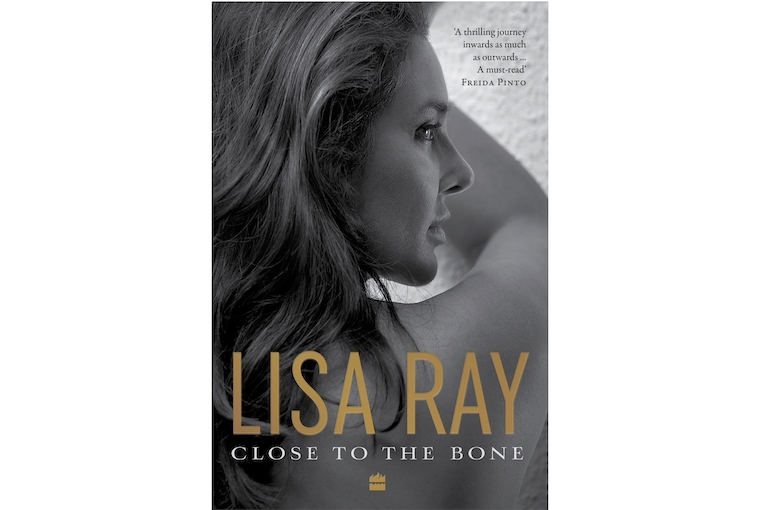

When you open Close to the Bone, the debut book by model turned writer, Lisa Ray, the first thing that arrests you are these words written on the inside of the book jacket, in a muted gold colour, ‘How fortunate it is when life alters you without warning’. At once, the anticipation of the misery associated with cancer and its victims or survivors is broken and positivity abounds this book.
There is a lot of honesty and heart in Ray’s prose. As she takes you through her journey, she explores many ideas like that of fame and spirituality, dismantles many facades of the glamour industry and opens up about her identity and nomadic existence with wit and charm. Certainly, the most appealing part of the memoir is how well Ray uses her words to connect with the readers and despite the many instances of heart breaks along the way, the book triumphs in the end. Quite aptly she writes at the end of the 'Prologue', ‘ I am composed of all things seen and known and experienced, the emotions of a life lived close to the bone.’
Excerpts from our conversation with her follow:
How and when did you decide to pen down your journey through your book Close To The Bone?
I was approached to write my memoir after I chronicled my cancer experiences in a blog called ‘The Yellow Diaries’ in 2010. I wrote many drafts then sat on the manuscript. Something blocked me intuitively. Perhaps I needed to digest my experiences. In the past year and half I rewrote everything, found my lit agent Jayapriya Vasudevan and Harper Collins India provided an empathetic and supportive home for my words.
“The title, Close to the Bone, not only is reflective of my blood cancer experience but it also implies the stripping away of layers to expose a core truth contained in all our bodies and pschyes.”
Could you take us behind you writing process of the book?
Whoa. That’s like asking an actor to reveal their technique. I honestly can’t. It’s a deeply solitary, personal and intuitive process for me.
How would you describe your relationship with writing as and how has the writing of this book affected you as a person?
I have always written- in my mind. It’s how I process the world. Books have been my constant companions and friends. Words, sentences, pages are like precious gems for me. I believe I was born to write. It’s a compulsion. It’s only taken me 30 years to get around to it.
Could you tell us more about the title Close To The Bone.
My first title: More Beautiful for Having Been Broken was deemed too long by my publisher Harper Collins India. I was disappointed until I sat down to write a short synopsis about the book and the phrase, ‘Close to the Bone’ sprang to my mind. It felt right. It not only is reflective of my blood cancer experience but it also implies the stripping away of layers to expose a core truth contained in all our bodies and pschyes. I’m a much better writer than speaker.

You call yourself a nomad, what does travel really mean to you now after living such a nomadic life? Have you found or reached a destination?
It’s a foreign concept for me to belong to a singular place. Perhaps it has something to do with being of mixed blood, or containing an indefinable impulse to travel and move from destination to destination. But India has always called to me and my family and I recently moved back to Mumbai. But todays’ world is about migration and perhaps we should change the concept of home: from identifying with a city or particular culture to defining home as the planet. The world. Perhaps we will treat the blue marble we inhabit with more respect and compassion. What I can share is I no longer use travel as an excuse to run from something- whether it be myself, or a situation. In that sense I’m at home in myself.
The movie Water plays a significant role in your narrative. How would you describe your experience and relationship with cinema so far?
I’ve written about my father’s influence on my cinematic tastes. We only ever watched what might be defined as ‘experimental’ or ‘art’ cinema: Kurosawa, Fellini, Godard, Ray, these were the masters I was exposed to. So when by pure serendipity I landed up in the Indian entertainment world in the 90s I was perplexed when I was offered mainstream roles- I simply couldn’t conceive being part of that cinema no matter the financial rewards. I always believed in the power of cinema to change, educate, move and elevate. Eventually Deepa Mehta recognised this thirst in me to be part of films with subversive themes and when I was a part of Water, I understood it to be the culmination of a life long desire. Sort of like writing Close to the Bone.
“My intention besides telling my story is to demystify: fame, the beauty industry, pain, the nature of love.”
What do you wish the readers take away from this book?
I really don’t know. But I know there are many relatable themes. I’ve been honest and compassionate. I cut over a few veins to write this book. It also represents my debut as a writer. I’m actually overwhelmed with the reactions so far. It seems to connect with readers. The best thing I can hope for is the reader to want me to write another book. My intention besides telling my story is to demystify: fame, the beauty industry, pain, the nature of love. And to share and connect with the reader. I’m naturally an introvert so I feel I can create an intimacy with many through my words that isn’t possible either
Any writers or artists in general that have significantly influenced you and your work?
Many. too many to name. Tishani Doshi. Farrokh Chothia. Suketu Mehta. Fellini. Deepa Mehta. Jhumpa Lahiri. Margaret Atwood. Alice Munro.
We will see you in the movie 99 Songs soon. How was your experience working in the film and what more are you working on next?
I’m also looking forward to seeing the film. Working in AR’s film was an elevating experience. Many more interesting creative projects on the anvil. But in case you still don’t take me seriously as a writer, I’m planning the next three books.
Text Nidhi Verma